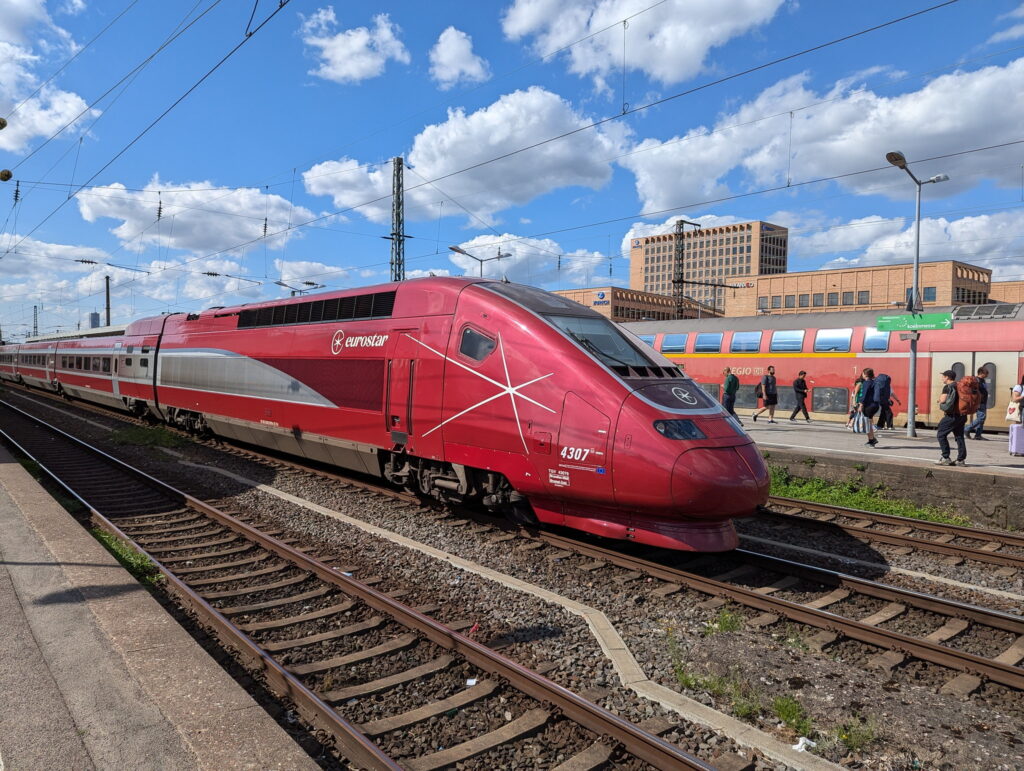A message from a friend this morning: “Have you seen that piece in The Guardian saying Eurostar is the worst performing train service in Europe?”
Oh what now, my heart sinking as I waited for her to send me the link.
This is The Guardian’s piece, and it relates to this report by Brussels based pressure group Transport & Environment.
And yes, there it is – Eurostar ranked bottom of all the companies assessed, with Trenitalia on top closely followed by SBB and, err, RegioJet. And with CFR, BDZ and Hellenic Train ranking as better than Eurostar.
Now as any of you who read my rail commentary know, I am not the biggest fan of Eurostar, especially its ex-Thalys arm on the Paris-Bruxelles route. But is it the worst performing in Europe? Hell no. So how then did it end up at the bottom of the ranking?
The answer is because trying to even compile a ranking like this is comparing apples and oranges.
Eurostar scored zero on the “night trains” category. Amazing! It’s a high speed operator, not a night train operator. And it scored very low on ticket price and low due to an absence of special fares and reductions. But hey ho, it’s a commercial service! Legacy operators like SNCF or DB are going to have lots of special fares that they are obliged to have as hangovers from their time as state owned monopolies.
Meanwhile German operators scored low due to a lack of reliability – not wrong as anyone who has travelled in Germany recently can attest. But I would put money on it that if Trenitalia (the highest scoring) started running trains tomorrow in Germany it would do no better.The quality of the outcome is about the entire system, not just an operator.
I could go on and on about the criteria, but I will resist. My critique here is not so much of this T&E report, but whether any report of this nature would make much sense. Buried in amongst the league tables in the PDF are some solid recommendations as to what different operators could do better, but little of that is new and does not get the media coverage anyway – it is the league table that does.
And in the end you have to ask yourself: what is the downside for T&E for having come up with such a spurious ranking?
It was not just The Guardian that swallowed it whole, but Spiegel and Tagesschau in Germany, SRF in Switzerland, El Pais in Spain, L’Express in France, BNNVARA in Netherlands. Even RailTech – industry press that should know better – covered it. Massive coverage of the report. Lots of eye balls on the ranking. Funders will be happy. When approaching policy makers in Brussels they’ve made the splash they wanted.
Meanwhile a bunch of folks online have been attempting serious analysis of the conclusions, or just getting annoyed at the spurious nature of the report. But in the end we don’t matter. “It’s complicated” is not a line that a busy journalist wants. Copy and paste the press release, generate controversy with the league table, job done. Some people in Eurostar’s headquarters might be fuming, but if you are T&E do you care?



There’s quite a bit of criticism here for a report that has succeeded in drawing much-needed attention to the rail sector!
Rankings like this—and their airline equivalents—resonate with a wide audience because they simplify complex issues (and often provide a kick of motivation for ranked entities to focus on where they are worst). While they may not satisfy experts (like you) in the field, they provide an accessible entry point for people (like me) who don’t have the time or technical expertise to engage with more detailed analysis (although I do follow you). Of course, any cross-country comparison will have its flaws, but even if German rail infrastructure challenges aren’t entirely DB’s fault, the comparison is a first step in adding quantified data to the broader conversation.
The weighting of categories is inevitably subjective, but that doesn’t make the exercise meaningless. For example, I’d always felt UK trains were pricier (but better at compensating for delays) than those elsewhere in Europe, and this report gave me an independent evaluation to validate that perception. Similarly, the absence of night trains on Eurostar might not seem relevant at first glance, but as I learned from reading a piece you wrote, a Channel Tunnel night train was considered at some point: these operators could consider it.
Instead of sceptically framing this as just an NGO seeking publicity or funding and trying to discredit their aims, why not see it as an opportunity to engage? Your experience and deep knowledge of the European train network could improve the next iteration of this ranking or at least remove the worst mistakes/omissions. Constructive collaboration would not only address some of your valid criticisms but also strengthen the shared goal we all have: making trains better and more accessible for everyone.
While it’s easy to criticise such rankings for oversimplifying or sensationalising, they do have the power to spotlight areas for improvement. In my work with the aviation sector, I frequently encounter the argument that “trains will never get much better.” With all your knowledge, I’d love to see your voice not just commentating and criticising but also helping making things better. But maybe that will be for the next generation of Jon Worths
We talk about trains *all the time*. We don’t need league tables such as this, sorry. And even by the standards of league tables, this is poor work, and really arbitrary. Were T&E to have wanted to do it better they know where to find me (or dozens of others). Hell they did not even employ a proof reader to check the acronym of DSB was correct!